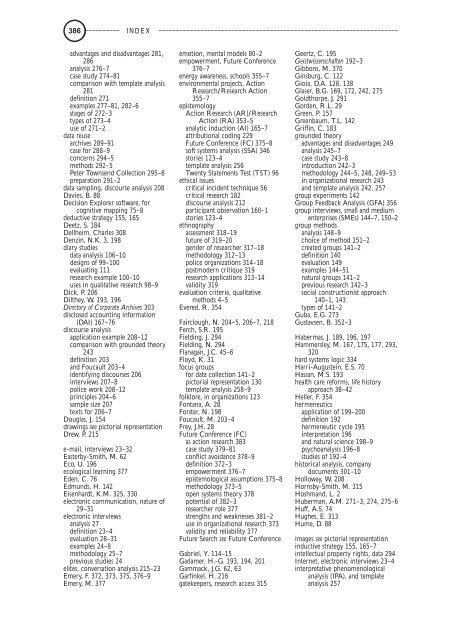essential-guide-to-qualitative-in-organizational-research
essential-guide-to-qualitative-in-organizational-research
essential-guide-to-qualitative-in-organizational-research
- No tags were found...
You also want an ePaper? Increase the reach of your titles
YUMPU automatically turns print PDFs into web optimized ePapers that Google loves.
386 –––––––––– INDEX –––––––––––––––––––––––––––––––––––––––––––––––––––––––––––––––––––––advantages and disadvantages 281,286analysis 276–7case study 274–81comparison with template analysis281def<strong>in</strong>ition 271examples 277–81, 282–6stages of 272–3types of 273–4use of 271–2data reusearchives 289–91case for 288–9concerns 294–5methods 292–5Peter Townsend Collection 295–8preparation 291–2data sampl<strong>in</strong>g, discourse analysis 208Davies, B. 88Decision Explorer software, forcognitive mapp<strong>in</strong>g 75–8deductive strategy 155, 165Deetz, S. 184Dellheim, Charles 308Denz<strong>in</strong>, N.K. 3, 198diary studiesdata analysis 106–10designs of 99–100evaluat<strong>in</strong>g 111<strong>research</strong> example 100–10uses <strong>in</strong> <strong>qualitative</strong> <strong>research</strong> 98–9Dick, P. 206Dilthey, W. 193, 196Direc<strong>to</strong>ry of Corporate Archives 303disclosed account<strong>in</strong>g <strong>in</strong>formation(DAI) 167–76discourse analysisapplication example 208–12comparison with grounded theory243def<strong>in</strong>ition 203and Foucault 203–4identify<strong>in</strong>g discourses 206<strong>in</strong>terviews 207–8police work 208–12pr<strong>in</strong>ciples 204–6sample size 207texts for 206–7Douglas, J. 154draw<strong>in</strong>gs see pic<strong>to</strong>rial representationDrew, P. 215e-mail, <strong>in</strong>terviews 23–32Easterby-Smith, M. 62Eco, U. 196ecological learn<strong>in</strong>g 377Eden, C. 76Edmunds, H. 142Eisenhardt, K.M. 325, 330electronic communication, nature of29–31electronic <strong>in</strong>terviewsanalysis 27def<strong>in</strong>ition 23–4evaluation 28–31examples 24–8methodology 25–7previous studies 24elites, conversation analysis 215–23Emery, F. 372, 373, 375, 376–9Emery, M. 377emotion, mental models 80–2empowerment, Future Conference376–7energy awareness, schools 355–7environmental projects, ActionResearch/Research Action355–7epistemologyAction Research (AR)/ResearchAction (RA) 353–5analytic <strong>in</strong>duction (AI) 165–7attributional cod<strong>in</strong>g 229Future Conference (FC) 375–8soft systems analysis (SSA) 346s<strong>to</strong>ries 123–4template analysis 256Twenty Statements Test (TST) 96ethical issuescritical <strong>in</strong>cident technique 56critical <strong>research</strong> 182discourse analysis 212participant observation 160–1s<strong>to</strong>ries 123–4ethnographyassessment 318–19future of 319–20gender of <strong>research</strong>er 317–18methodology 312–13police organizations 314–18postmodern critique 319<strong>research</strong> applications 313–14validity 319evaluation criteria, <strong>qualitative</strong>methods 4–5Evered, R. 354Fairclough, N. 204–5, 206–7, 218Ferch, S.R. 195Field<strong>in</strong>g, J. 294Field<strong>in</strong>g, N. 294Flanagan, J.C. 45–6Floyd, K. 31focus groupsfor data collection 141–2pic<strong>to</strong>rial representation 130template analysis 258–9folklore, <strong>in</strong> organizations 123Fontana, A. 28Forster, N. 198Foucault, M. 203–4Frey, J.H. 28Future Conference (FC)as action <strong>research</strong> 383case study 379–81conflict avoidance 378–9def<strong>in</strong>ition 372–3empowerment 376–7epistemological assumptions 375–8methodology 373–5open systems theory 378potential of 382–3<strong>research</strong>er role 377strengths and weaknesses 381–2use <strong>in</strong> <strong>organizational</strong> <strong>research</strong> 373validity and reliability 377Future Search see Future ConferenceGabriel, Y. 114–15Gadamer, H.-G. 193, 194, 201Gammack, J.G. 62, 63Garf<strong>in</strong>kel, H. 216gatekeepers, <strong>research</strong> access 315Geertz, C. 195Geistwissenschaften 192–3Gibbons, M. 370G<strong>in</strong>sburg, C. 122Gioia, D.A. 128, 138Glaser, B.G. 169, 172, 242, 275Goldthorpe, J. 291Gorden, R.L. 29Green, P. 157Greenbaum, T.L. 142Griff<strong>in</strong>, C. 183grounded theoryadvantages and disadvantages 249analysis 245–7case study 243–8<strong>in</strong>troduction 242–3methodology 244–5, 248, 249–53<strong>in</strong> <strong>organizational</strong> <strong>research</strong> 243and template analysis 242, 257group experiments 142Group Feedback Analysis (GFA) 356group <strong>in</strong>terviews, small and mediumenterprises (SMEs) 144–7, 150–2group methodsanalysis 148–9choice of method 151–2created groups 141–2def<strong>in</strong>ition 140evaluation 149examples 144–51natural groups 141–2previous <strong>research</strong> 142–3social constructionist approach140–1, 143types of 141–2Guba, E.G. 273Gustavsen, B. 352–3Habermas, J. 189, 196, 197Hammersley, M. 167, 175, 177, 293,320hard systems logic 334Harri-Auguste<strong>in</strong>, E.S. 70Hassan, M.S. 193health care reforms, life his<strong>to</strong>ryapproach 38–42Heller, F. 354hermeneuticsapplication of 199–200def<strong>in</strong>ition 192hermeneutic cycle 195<strong>in</strong>terpretation 196and natural science 198–9psychoanalysis 196–8studies of 192–4his<strong>to</strong>rical analysis, companydocuments 301–10Holloway, W. 208Hornsby-Smith, M. 315Hoshmand, L. 2Huberman, A.M. 271–3, 274, 275–6Huff, A.S. 74Hughes, E. 313Hume, D. 88images see pic<strong>to</strong>rial representation<strong>in</strong>ductive strategy 155, 165–7<strong>in</strong>tellectual property rights, data 294Internet, electronic <strong>in</strong>terviews 23–4<strong>in</strong>terpretative phenomenologicalanalysis (IPA), and templateanalysis 257



